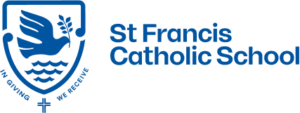
Curriculum
About our curriculum
St Francis Catholic School uses the NZ Curriculum, effective pedagogy and collaborative practices to give our children the best possible educational opportunities.
Areas of Learning:
- Religious Education
- English
- Mathematics
- The Arts
- Health and Physical Education
- Science
- Social Sciences
- Technology
- Learning Languages
Curriculum Principles
The New Zealand Curriculum Principles put the student at the centre of teaching and learning, asserting that they experience a curriculum that engages and challenges them; is forward-looking and inclusive and affirms New Zealand’s unique identity.
The New Zealand Curriculum identifies five key competencies:
- Thinking
- Using language, symbols and texts
- Managing self
- Relating to others
- Participating and contributing
Literacy and Mathematics
Strong literacy and maths skills provide a foundation for learning, so students can enjoy full and meaningful lives secure in their identities, languages, cultures, and values. These foundational skills help sustain their wellbeing and that of their whānau and communities. They are critical factors in the learning journey from early learning right through to the end of secondary education and beyond.
We pride ourselves on catering for individual students. Deliberate teaching through small group workshops happens every day in our classrooms. We believe in flexible grouping where children are grouped based on a variety of criteria. This could be, for example, ability groups, mixed ability or interest groups. Groups change regularly to meet the needs of learners.
Cultural
Our students develop their capacity to learn further languages and explore different world views in relation to their own. We have whānau from more than 20 different cultural backgrounds and we provide many opportunities to celebrate our traditions and heritage. We have a number of cultural groups and a fantastic Kapa Haka group. Te reo Māori, the indigenous language of New Zealand, is a taonga and protected under the Treaty of Waitangi. Students will be given the opportunity to learn te reo and tikanga Māori and communicate this understanding with others, while demonstrating an awareness of the school’s Catholic Character.
Useful links
Religious Education
In Catholic schools, Religious Education is teaching and learning what the Catholic Church believes and teaches – it aims to enable children to understand and appreciate how people live, pray and celebrate and how they can respond freely to God according to their gift of faith. The NZ RE programme reflects the understanding that from ‘learning about Jesus’, children can grow to ‘love Jesus and want to follow him as a disciple’. Evidence of this growth can be seen as they share the outcomes of their learning through their prayer, stories, artworks, games, drama, digital learning, music and scripture activities.
Gospel Values – faith, hope, love, compassion, stewardship, wonder and awe, dignity of the person, solidarity with the poor, community, peace, respect for all life, integrity, self-control, courage, truth, freedom, joy, fortitude, justice and prudence.
Gospel Values in Te Reo – tika, tikanga (truth, integrity, truthfulness); pono (honesty, sincerity, openness); aroha (love, empathy, understanding, equity, developing relationships, being open to other cultures and beliefs); hohou – rongo (making peace, reconciliation), manaaki, manaakitanga (respect, care far, hospitality), rangimarie (peace)
Digital Learning
Our goal is to ensure that all learners have the opportunity to become digitally capable individuals. This provides a focus on students building their skills so they can be innovative creators of digital solutions rather than ‘device users’. While we limit the ‘screen time’ of our junior students, our older students are expected to be digitally literate and independent before they leave for college.
We also run a robust cyber safety / using an online critical thinking programme.
Helping at Home
A helpful link that tells you where your child should be in their learning, what they are learning at school and how you can help: (in English and other languages)
http://nzcurriculum.tki.org.nz/Archives/Assessment/Supporting-parents-and-whanau/Resources
Great practical ideas for helping with learning at home: https://parents.education.govt.nz/primary-school/learning-and-development-at-home/ideas-to-help-with-reading-writing-and-maths/
Sports
Sporting Opportunities
Participating in sports is important for students to not only help them stay healthy and active, but also teach various skills to students like leadership, patience, patience, team efforts, and social skills. We offer our students a variety of sporting opportunities throughout the year.
Winter Sports
Netball, rugby, rippa rugby, league, soccer, basketball, hockey etc
Summer Sports
Basketball, cricket, soccer, touch rugby, summer netball, athletics, swimming etc
Out-of-school Sports
St Francis has a number of out-of-school sports teams our students are involved in throughout the year including netball, soccer, rugby, touch rugby, basketball and flipperball. These teams are successful with the help of parent involvement with coaching and management. Please contact Sports Leader, Dan Wright, danielw@stfrancis.school.nz.
Interschool Sports
St Francis competes in inter-school sports events throughout Auckland with trials and coaching held at the school. Our teams are selected and coached at school before each tournament. We compete in:
- Netball
- Soccer
- Rugby, rugby league, touch rugby and rippa rugby
- Cross country
- Soccer
- Athletics
- Hockey
St Francis also holds sports days, an annual cross country day and school athletics day at Walker Park, Pt Chevalier.
Special programmes
Garden to Table
Our Garden to Table programme takes learning out of the classroom and into the garden and the kitchen. Through hands-on classes, students learn practical cooking and gardening skills about preparing and harvesting food.
Skills learnt at Garden to Table help students learn where food comes from, encourages healthy eating and help to connect our community by eating together and of course teamwork. Students also learn the importance of sustainability with all food scraps composted in the school worm farm.
Sacramental Programme
Our Sacramental programme is run by Father John Webb. It takes place after Sunday mass and takes our students on a journey through the Catholic faith. The programme (which has limited places) is open to students aged 9-plus who are already baptised but looking to celebrate the Sacraments.
Music Education Centre
We understand families lead busy lives. St Francis works alongside The Music Education Centre so children can learn an instrument with group or individual lessons during school hours. There are many musical options to choose from including guitar, piano, violin and drums.
Shine Speech and Drama
These after-school classes inspire confidence and imagination, helping students communicate effectively and build self-belief that helps them succeed in life. Shine Speech and Drama covers: public speaking, acting skills, voice (projection and articulation), reading aloud skills, positive body language, storytelling, and relationship skills. For more information email shine@shine.school.nz
Art Classes
These workshops held after school hours provide opportunities to make art, teach and encourage a creative approach that can be taken and applied to every aspect of a student’s life. For more information visit: www.creativematters.co.nz/after-school-art-classes
Bricks 4 Kidz
This STEAM-based activity for kids runs on the idea that every child can be a scientist or engineer. Using LEGO® Bricks, our classes, parties and workshops explore real-world concepts related to physical science, engineering and technology, giving kids a chance to understand the forces and designs that power our world. For more information visit: www.bricks4kidz.co.nz
Reporting
School Reports
In terms two and four, look out for your mid and end of year reports. These reports focus on telling you about your child’s achievement, progress, learning behaviours and work habits. You’ll find out about:
- How they’re working at learning time,
- How they’re showing the key competencies of the New Zealand curriculum
- Student reflection on learning
- Student achievement in formal and informal assessments
- Current achievement across the curriculum
Parent/Teacher conferences
Held near the end of term two, this is an opportunity to have a formal discussion with your child’s teacher and talk about the progress your child is making.
It’s worthwhile for you and your child to do some preparation and make some notes to make the most of the time:
- think about what you have noticed about your child’s work – parents often notice things when they are helping their child with homework
- talk to your child about how they feel about school and anything that they are really enjoying, finding too easy or too difficult
- ask them if there’s anything they want you to talk about with the teacher.
- read any recent school reports and write down any questions you have about them.
What sort of questions might I ask?
- Does my child participate (take part) well in class?
- Is my child progressing as expected?
- What do they do well?
- What do they need help with?
- What can I do to help?
- Does my child seem settled at school? How do they get along with others?
- Are there any areas of concern?
- What’s the best way to contact you if I want to follow up on anything we’ve talked about?
You can often talk to the teacher in person for brief discussions without needing to make an appointment – just make sure you approach the teacher well outside of class times.
If you want to have more time for a longer conversation, it’s best to make an appointment so that you all have plenty of time to talk.
